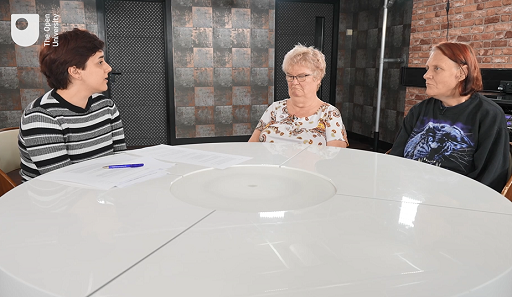1 What are ‘behaviours that challenge others’?
You will start by hearing members of the panel discussing the term ‘behaviours that challenge others’.
Activity 1 Defining behaviours that challenge others
Watch this video of our panel members taking about the term ‘behaviours that challenge others’.
As you watch the video, make notes in the text box below on:
- why people might display these behaviours
- the implications of using terms such as ‘challenging behaviours’ or ‘behaviours that challenge others’.

Transcript
LISA: So hi you guys.
BOTH: Hi.
LISA Nice to have you here.
DAWN: It’s nice to be here.
LISA: Great. Thank you for that, Dawn. So as you guys know we’re talking a lot about challenging behaviours in this project, and I suppose I want to know more about what you guys think of those words, challenging behaviours or behaviours that challenge others. What do you think about them?
DAWN: I think saying that is a label, and I don’t like to be labelled.
PAM: I also think it’s just I’d rather have behaviour that challenges than the challenging behaviour because it sounds better.
LISA: Why does it sound better to you?
PAM: Because it’s people that has behaviour throughout their lives, and I suffer from behaviour problems myself so I know I’d rather have that version of it than the other version because it sounds a bit better.
LISA: I see what you mean. Thanks for that Pam. That’s really, really helpful there. And do you think challenging behaviour is always a problem for people?
DAWN: It can be. But with the right support and everything in place, I think it can be solved.
LISA: And why do those challenging behaviours happen?
PAM: It’s because they can’t express their feelings as well as some others. Because some of them can’t speak or talk so they have behaviours that make some people listen, and say that the behaviour is happening because of this or something is happening to them that they’re not feeling well so they express it by behaviour.
LISA: Yeah, and it definitely happens when people aren’t feeling well. What other times might people have challenging behaviours?
DAWN: Moving house or routine. Being in a room with a lot of people.
LISA: Yeah, maybe feeling a little bit of overwhelmedness I suppose with that. Yeah.
PAM: That even secure hospitals can cause behaviour that challenges as well.
LISA: Yeah, strange sort of not very nice place.
PAM: Yeah.
LISA: Yeah, those things can definitely trigger those challenging behaviours definitely. And who do those behaviours challenge?
PAM: The family, the carers, the people themselves because they’re not happy where they are so they have behaviour.
GAIL: So I really dislike the term challenging behaviour. So I’m really pleased that people are starting to think about that in a way. It almost always puts the onus on the person as if it’s the behaviour is their fault, and it’s something they can do about. As far as I’m concerned, all behaviour is communication. All behaviour however we behave, and we are all capable of behaving in a challenging way.
I have a son that doesn’t use words to communicate. He communicates with gesture, with sound, with his behaviour, and how he behaves and how he does things, and it’s how we know what he’s saying. So his behaviour over the years felt like he was very close to getting that label which I would always come down on and say, no, he’s not. He's just trying to tell you something, and you need to learn to listen.
So how people communicate-- their behaviour might be challenging to other people, other people might find how they behave challenging, but behaviour is communicating. What are they trying to tell you? What are they communicating with their behaviour? And it’s not just people that don’t use words to communicate. It will be other people who maybe have a limited understanding.
So we need to shift the narrative around that completely to think about how we think about what is being said, what are they saying to you? The onus is on us as people, as families, as people who are working alongside someone with a learning disability to understand and to learn how they communicate, and what they are communicating.
BEN: I think for me the term behaviour that challenges others or behaviour that challenges is a much more palatable phrase than challenging behaviour, which puts a lot of the onus on the person and the behaviours that they exhibit. Behaviours that challenge actually focuses for me anyway on the people who are challenged, which is usually practitioners, services, and families, and professional carers.
I think that the term behaviours that challenge-- I usually in my practice I usually put behaviours that challenge services because it is those people or those services that do find themselves challenged by people who exhibit difficult to manage behaviours. There we go. I’ve just thrown another one in there as well.
But I think to take the onus away from the person and place it squarely on those services is the right thing to do because obviously somebody who is exhibiting behaviours that challenge, is already in great distress, and it’s almost like they’re being blamed for those behaviours without any sort of attempt at understanding why those behaviours exist in the first place.
So from my personal practice, one of the things that I found when working with people who were exhibiting behaviours that challenge, it was usually a crisis. However, when you worked with people you uncovered that actually there’s been a buildup to these behaviours occurring, and it was usually due to either environmental or physical difficulties that the person was having.
And sometimes when you are in a crisis, what you find is that staff and families tend to just focus on the behaviours rather than looking at the bigger picture. And I get that. I completely get that because it’s difficult to see wider than what you’re faced with right in front of you. Yeah, I think one of the things that immediately comes to mind about some of the problems that might come with having a label of behaviours that challenge is that it sticks with a person.
It’s a label that can create a lot of difficulty for a person as they move through the system or their life. I remember you know an example from working in practice being asked to support a gentleman who had a file this thick, and all it was about was about the risks that this person presented with, and it was scary to read, and it made me very anxious about working with him.
Thankfully we had a good working relationship. And whilst those risks were present, we were able to work with this chap to help him live a life that was that he felt was of value. But I think the label of I’m going to use the term challenging behaviour is a difficult one to shake off on somebody once it’s written in somebody’s notes.
And I think that that change in language to take the focus off the person and highlight and recognise that actually the services and system around that person that are challenged helps in terms of people being able to live fuller lives.
Discussion
Everyone on the panel agreed that behaviour is a form of communication. They emphasised that it is important for practitioners and families to learn and understand what the person is trying to express and why they may be exhibiting a particular behaviour, at a particular time. Behaviours may emerge because the person is unwell, distressed, or due to specific issues within their environment. All panel members preferred the term ‘behaviours that challenge others’ to ‘challenging behaviours’ because it shifts the onus away from the person, and places responsibility on services to understand and respond to these behaviours in more sensitive and appropriate ways. However, as panel members pointed out, regardless of the precise wording used, the term can become a label that unhelpfully ‘sticks’ to people, prejudicing how they are treated by services and limiting the opportunities available to them. As Ben highlighted in the example he gave from his own practice, practitioners need to engage with the person and their needs and take a reflective and critical perspective with regards to labels that have been previously assigned to a person.
It is important to remember that ‘behaviour that challenges others’ (sometimes referred to as ‘challenging behaviour’ or ‘behaviours of concern’) is not a diagnosis. Rather, it is a label that is given to people’s behaviour for a variety of reasons and purposes. This label may be used to refer to things like aggression, self-injury, stereotypic behaviour, withdrawal, and disruptive or destructive behaviour (NICE, 2015). But it is critical to understand why people behave in these ways, and in what contexts. People may be trying to communicate or be engaging in sensory stimulation (The Challenging Behaviour Foundation, 2021). People may also be trying to gain help or avoid demands. We also know that some environments or situations may increase the likelihood of these behaviours occurring, for example, due to boredom, anxiety, distress, or pain. People may behave in these ways because of excessive noise, lack of choice, and sensory issues, or because they are in an inappropriate, neglectful or abusive care environment (NICE, 2015). And sometimes the behaviours are linked to events that have happened in a person’s life history (Mansell, 2007). The behaviours may be consistent over long periods of time, but they may come and go, depending on the context.
Activity 2 To label or not to label?
Do you think it can ever be helpful to label people as having ‘behaviours that challenge others’?
In this course, the term ‘behaviours that challenge others’ is used to show how relational and subjective this area of practice is. As a practitioner, it is essential that you continually reflect your own framing of ‘behaviours that challenge others’, with a continued focus on how to best support people’s health and wellbeing.

